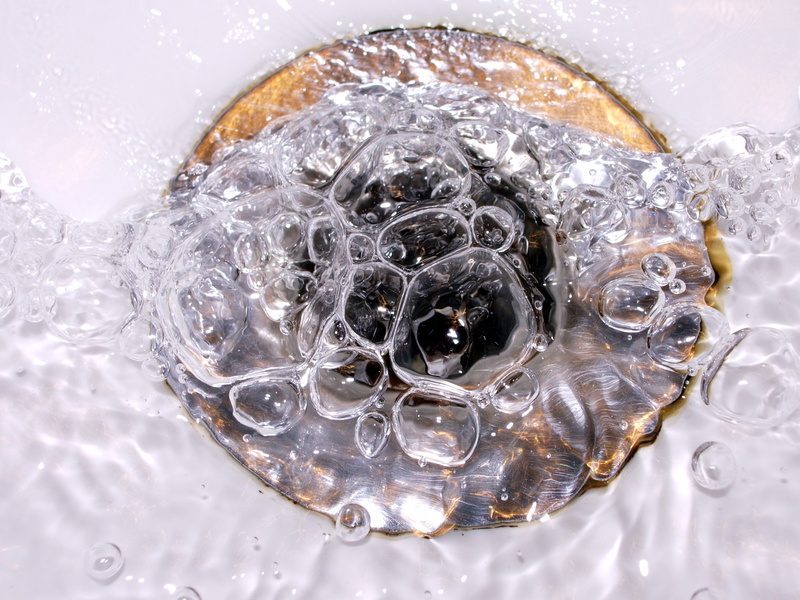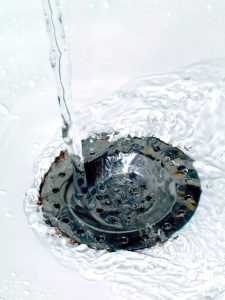The backflow preventer is a critical device for most commercial buildings, and is sometimes found I use homes and for larger residential structures. The backflow preventer is designed to protect the municipal water system from backflow, which is when waste water from the sewer system side of the plumbing ends up moving into the potable fresh water side, possibly contaminating the municipal fresh water supply. This isn’t something that’s a problem in most homes—there’s a simple air gap device to prevent backflow in the few places it can happen, such as a dishwasher—but it’s a major danger for commercial plumbing. Commercial plumbing has cross connections where there is the potential for backflow to occur and the fresh water becoming contaminated with bacteria and the microbes contained in waste water.
Red Rock Mechanical, LLC Blog: Archive for the ‘Drain and Sewer’ Category
Are Clogged Drains Out of Control in Your Home?
Monday, August 21st, 2017
 Everybody has run into a clogged drain at one time or another. They’re just “one of those things” when it comes to household inconveniences. Can’t get rid of them entirely—sometimes they just happen, and you have to deal with them using the tools you have available (a plunger, a hand-cranked drain snake, but not chemical cleaners) or else contact a plumber to take care of it.
Everybody has run into a clogged drain at one time or another. They’re just “one of those things” when it comes to household inconveniences. Can’t get rid of them entirely—sometimes they just happen, and you have to deal with them using the tools you have available (a plunger, a hand-cranked drain snake, but not chemical cleaners) or else contact a plumber to take care of it.
But what if drain clogs aren’t an occasional aggravation in your home? What if they are a continual, bonafide out-of-control nuisance that has you gritting your teeth every day?
Well, you may something more serious going on than a clot of grease or a tangle of hair in your drain. And it will probably take the work of our professional plumbers to help you out.
Warnings Those Clogged Drains May Be Sewer Line Problems
Monday, April 10th, 2017
 Nobody wants to encounter a slow or clogged drain in their home. It’s an annoyance and can bring simple tasks in the household to an indefinite halt until it can be remedied. Fortunately, clearing out a clog isn’t a tough job. If you can’t manage it using a basic drain plunger or with a hand-cranked drain snake (don’t use chemical cleaners, please!), you can always call our plumbers any time of the day or night and we’ll have the drain cleared out fast.
Nobody wants to encounter a slow or clogged drain in their home. It’s an annoyance and can bring simple tasks in the household to an indefinite halt until it can be remedied. Fortunately, clearing out a clog isn’t a tough job. If you can’t manage it using a basic drain plunger or with a hand-cranked drain snake (don’t use chemical cleaners, please!), you can always call our plumbers any time of the day or night and we’ll have the drain cleared out fast.
However, clogged and slow drains sometimes indicate a problem that runs deeper than blockage in a drain pipe. Your home’s sewer line might be suffering from breaks, obstructions due to tree root infiltration, or organic and inorganic build-up. These are more serious troubles than drain clogs, because they can lead to the full failure of your home’s drainage system and eventually sewage backing up into the basement or foundation.
Post-Holidays: A Good Time for Drain Cleaning!
Tuesday, December 27th, 2016
The holiday season is almost behind us. January is the month when we return to work and look ahead at the year and think of important chores that need to be done. January is a “clean-up and maintenance month.” One bit of house-cleaning that we recommend is drain cleaning.
You may not have thought about arranging for professional drain cleaning services before (no, pouring chemicals down the drains is not “drain cleaning”), but you’ll be impressed at what a difference it will make during the rest of the year.
Why Am I Experiencing So Many Drain Clogs?
Monday, June 20th, 2016
Drain clogs… nobody likes them. But we’ve settled on them as something that will happen from time to time in our plumbing, and we simply need to know the right way to deal with them. This usually means a basic sink plunger, followed by a call to a professional plumber if it doesn’t work. (Don’t, and we repeat, don’t use chemical drain cleaners, which can harm both your drains and you!)
How to Tell You Need Drain Cleaning
Monday, February 22nd, 2016
Why a Store-Bought Drain Snake Isn’t the Best Answer for Drain Cleaning
Monday, December 7th, 2015
You have a clog in one of your sinks, such as the main kitchen sink. This is obviously a serious problem, and you need it fixed right away. What should you do?
The first response is probably to reach for a sink plunger, if you have one. The second response may be to use chemical drain cleaners, but don’t do this. (These acidic chemicals are bad news for drains and everyone in your household.)
Another response is to use a hand-cranked drain auger, a “drain snake.” This is one of the better ways to get rid of a clog—but only as a temporary fix. A drain snake isn’t a form of draining cleaning, and if you want a tough clog not only removed, but the source of the clog removed as well, you need to call professional plumbers.
Plumbing Advice for a Happier Thanksgiving
Monday, November 23rd, 2015
It’s difficult to believe that the Thanksgiving holiday is here. That means family, Turkey, stuffing, and football! But it can also mean a hard time for the plumbing in your house, particularly the kitchen drain and garbage disposal. You do more cooking this weekend than any other weekend during the year, and it’s a good idea to take some steps to protect your kitchen plumbing. We’ve gathered together a few of the most helpful suggestions for healthy plumbing this Thanksgiving.
3 Signs of Sewer Line Damage to Watch For
Monday, June 1st, 2015
The sewer line that serves your home is a part of the plumbing that you won’t think about very often: it does its important job—the removal of collected solid waste and waste water from the home and out to the municipal plumbing system—underground and out of sight. That’s just as it should be. But this does create the problem of making it difficult to know when the pipe has suffered from damage causing a leak or blockage. Corrosion, tree root infiltration, and construction can create problems in sewer lines, and the sooner you can detect the problem and call for plumbers, the better off you’ll be. Below are three signs you can watch for that will warn you that you may have a sewer line in trouble.







